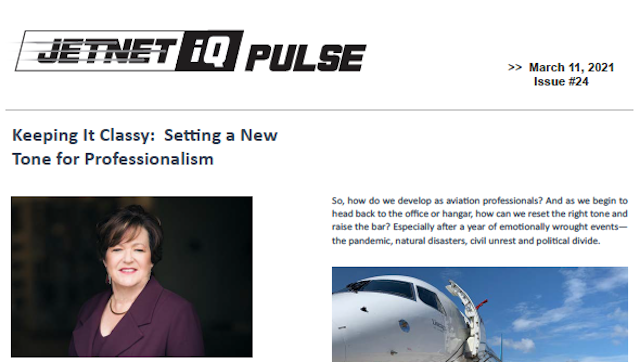This “Keeping it Classy” article originally appeared in the March 11th issue of the JETNET iQ PULSE newsletter. Download the PDF here.
FromRollie Vincent, JETNET iQ Creator/Director
“Sheryl Barden, one of our industry’s most acknowledged experts on all things people, joins us in this issue of JETNET iQ PULSE to share insights on the ever-evolving world of the business aviation workplace. As organizations grapple with the most effective means to engage and re-engage with their people – whether they are working remotely or not – Sheryl’s observations on professionalism are timely, classy, and hands-on practical.”
Keeping it Classy: Setting a New Tone for Professionalism
Regardless of our particular roles, we—all of us—serve as ambassadors for our companies. How we show up, how we lead, how we listen and communicate are all facets of being an aviation professional. And one more facet is our pursuit of self-development, in an ongoing quest for continuous improvement.
What is Professionalism?
The NBAA Safety Committee identifies professionalism in aviation as: “The pursuit of excellence through discipline, ethical behavior and continuous improvement.” And NBAA board member Rich Walsh adds to that description by emphasizing the need for people to be “committed to sharing and developing the talent around them.” What Rich is saying is that a professional must have the expertise to mentor and the humility to be willing to be developed.
So, how do we develop as aviation professionals? And as we begin to head back to the office or hangar, how can we reset the right tone and raise the bar? Especially after a year of emotionally wrought events—the pandemic, natural disasters, civil unrest and political divide.
Following are a few observations:
Listen
Many people have things to say, but few are actually willing to listen. As we become more attuned to our team and our surroundings, we naturally become more open to new ideas. But when we are too busy to listen—when we turn to our phones, jump in too soon with our opinions or make premature assumptions—we prevent others’ thoughts and ideas from being adequately expressed. Listening heightens our awareness. Plus, it’s a sign of courtesy, maturity and respect.
Author and lecturer Dr. Brené Brown said: “One of the fastest ways we build trust is when we listen more than we talk. We ask what’s getting in the way and we try to figure out our part in things. What are we doing that’s undermining trust and safety in our teams? That’s really where we have to start.”
Lead by Example
Leadership roles are given to those who look and act the part. Those who “walk the talk,” so to speak. Is everyone on the team carrying his or her own weight? As a leader, are you having the hard conversations with the difficult employee who’s making life miserable for the others? I’ve learned firsthand that the biggest demotivator to taking corrective action is when I don’t act swiftly enough to begin with.
Maintain Civility
In elementary school, kids are taught “The Golden Rule” and urged to practice kindness (“Do unto others . . .” etc.) Yet somehow—partly due, perhaps, to the increasingly disrespectful tone of network news and social media—many of us have lost our sense of civility. We think we’re entitled to share our opinion (sometimes too abrasively). This ill-mannered behavior is creating wide divisions, and when it comes to the workplace, it’s fostering an atmosphere that puts our aviation clients and colleagues at risk—operationally, emotionally and physically. It will take hard work, but we can and must re-establish that enviable sense of family-like camaraderie for which business aviation has always been regarded.
Ditch the Gadgets
Our phones have become an emotional crutch, in many respects. Try putting them down and, instead, opt for in-person conversations. Or make a phone call vs. sending an email or text. Our digital interactions with our colleagues may have increased, but thanks to our phones, social media and other impersonal technologies, the ties that bind us are weakening. We’re not as personally connected to the people at the other end of our communication as we are when we interact face-to-face.
Create Some Distance
Despite the close relationships we build in business aviation, it’s a good rule of thumb to add into them some professional distance. Especially with aircraft owners and “people in the back” of the aircraft. Remember that we’re here to serve, not to be someone’s buddy. So the rule ought to be to create some space between you and your clients. As I often say to my son and my team alike, “Keep it classy.”
Be Fit for Duty
Are you healthy emotionally and physically? Fitness for duty—even when “duty” means working from home—is all about taking good care of yourself. Getting enough rest, creating work/life balance and setting boundaries to create space between work and home—these are all components of fitness as it relates to professionalism.
The Path Forward
So how about it? In this “new normal” environment, are you “keeping it classy” when it comes to creating your own tone for and concept of professionalism? Dr. Brown tells us that as time passes, a new workplace is emerging, as well as a new idea about what professionalism actually means. The new “professional space” is not the place we used to know—that might be gone for good. But it’s been supplanted by something arguably better—a place where we can really establish a new sense of belonging, a new sense of progress and prosperity. One where we can truly help ourselves to grow, and others to thrive.
Sheryl Barden, CAM, is a member of the International Aviation Womens Association (IAWA), Flight Safety Foundation (FSF), Women in Corporate Aviation (WCA), Society for Human Resources Management and the National Business Aviation Association (NBAA). She serves on NBAA’s Board of Directors, is Chair of the NBAA Advisory Council and, for six years, served on the NBAA Corporate Aviation Management Committee. Additionally, she’s past president of the International Women’s Forum of Northern California.

